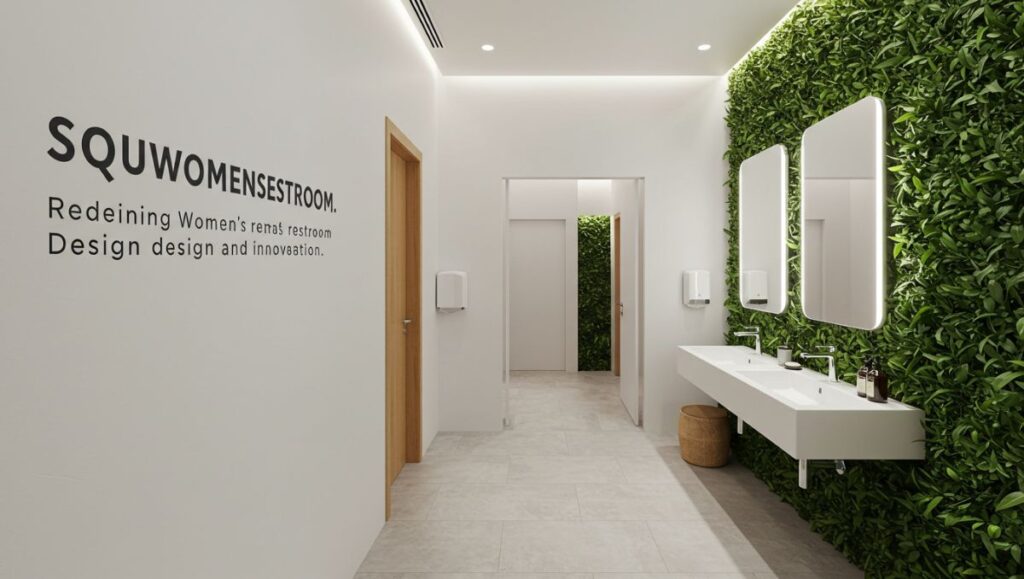Public restrooms have long been a measure of how inclusive, hygienic, and functional a space truly is. Among them, the women’s restroom often faces unique challenges: long wait times, lack of space, limited accessibility, and varying hygiene standards.
That’s where the concept of sqrwomensrestroom comes in. By merging modern design principles, smart technology, and inclusivity, sqrwomensrestroom represents the next generation of restroom solutions for women.
What Is Sqrwomensrestroom?
At its core, sqrwomensrestroom can be understood as:
-
SQR → symbolizing “square” (design/layout), “secure” (safety), and “smart quality restroom.”
-
Womens Restroom → dedicated spaces designed for comfort, hygiene, and inclusivity.
Put together, sqrwomensrestroom refers to a reimagined, smarter restroom experience for women—whether in malls, workplaces, airports, or public institutions.
The Challenges of Traditional Women’s Restrooms
1. Long Queues
Women often face longer waiting times due to inadequate stall numbers and inefficient layouts.
2. Hygiene Issues
Cleaning standards vary, leading to discomfort and potential health risks.
3. Safety Concerns
Poor lighting, lack of secure access, or hidden areas may create vulnerability.
4. Accessibility
Not all restrooms are designed with mothers, children, or individuals with disabilities in mind.
These challenges highlight why innovation in women’s restroom design is essential.
Key Features of Sqrwomensrestroom
1. Smart Layouts (SQR as “Square”)
Optimized stall arrangements and wider spaces reduce waiting time and improve comfort.
2. Hygiene Technology
-
Touchless entry and flushing.
-
Automated cleaning systems.
-
Air purification for odor and bacteria control.
3. Safety First
-
Well-lit spaces with smart sensors.
-
Secure locks with emergency overrides.
-
Panic buttons or connected safety features.
4. Inclusivity
-
Nursing rooms for mothers.
-
Changing tables and child-friendly stalls.
-
Accessible designs for individuals with disabilities.
5. Sustainability
-
Water-saving fixtures.
-
Eco-friendly cleaning systems.
-
Smart monitoring to reduce resource waste.
Sqrwomensrestroom and Digital Integration
Mobile Connectivity
Users could check availability of stalls or cleanliness ratings via an app.
Smart Monitoring
IoT sensors track usage, cleaning schedules, and maintenance needs.
Feedback Systems
Visitors can rate hygiene and safety, ensuring accountability.
This makes sqr womensrestroom not just a physical facility, but a digital ecosystem for restroom management.
Why Sqrwomensrestroom Matters
Empowering Women’s Comfort
A well-designed restroom improves overall experiences in public spaces, workplaces, and events.
Public Health Benefits
Higher hygiene standards help prevent illness and infections.
Social Equality
By addressing women’s unique restroom challenges, sqr womensrestroom promotes inclusivity and fairness.
Global Trends That Support Sqrwomensrestroom
-
Smart Cities Movement – integrating technology into public infrastructure.
-
Sustainability Goals – focusing on eco-friendly building design.
-
Feminist Urban Planning – creating spaces that respond to women’s needs.
-
Digital Hygiene Solutions – accelerated by global health awareness.
These trends show sqr womensrestroom is not just relevant—it’s inevitable.
The Future of Sqrwomensrestroom
In the coming years, sqr womensrestroom could evolve into:
-
Standardized smart restrooms in airports, schools, and offices.
-
Subscription-based cleaning services connected to digital monitoring.
-
AI-powered safety systems ensuring real-time alerts and secure spaces.
-
Design models adopted globally as best practice for women’s facilities.
Conclusion
Sqrwomensrestroom represents a vision of the future: safe, hygienic, inclusive, and sustainable restrooms tailored for women’s needs.
By integrating design innovation, smart technology, and inclusivity, sqr womensrestroom addresses long-standing challenges while setting new standards for comfort and dignity in public and private spaces.
It’s more than just a restroom concept—it’s a movement toward better infrastructure for women worldwide.






